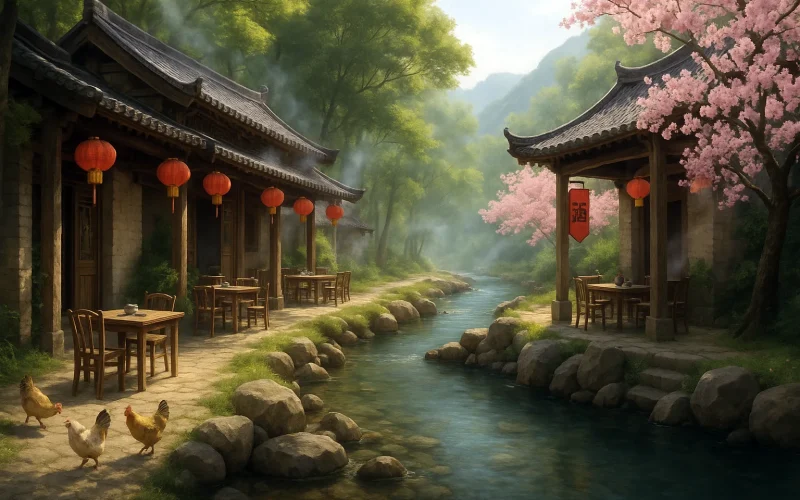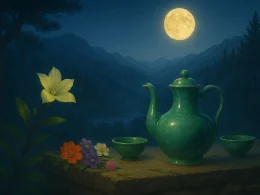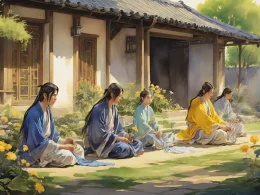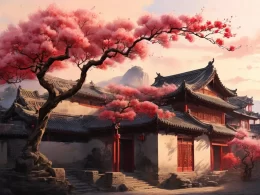Love deep, heart true—
Eyebrows long, hair blue.
In moonlit bower she tunes her zither,
Singing spring breezes hither.
Missing you, dreaming you—
Soul entangled through and through.
Jade screens warm with vanished scent,
How can she bear wine's lament?
Original Poem
「四字令 · 情深意真」
情深意真。眉长鬓青。
小楼明月调筝。写春风数声。思君忆君。魂牵梦萦。
刘过
翠销香暖云屏。更那堪酒醒。
Interpretation
Composed during the Southern Song Dynasty, this lyric by Liu Guo delicately portrays a woman's profound longing for her beloved. Through layered descriptions—physical appearance, environmental atmosphere, musical expression, and dream visions—the poem reveals her solitary suffering in a moonlit tower. While embracing the restrained elegance of the wanyue (婉约) style, it retains Liu's characteristic emotional directness, blending subtlety with raw sincerity in a masterful fusion of poetic traditions.
First Stanza: "情深意真。眉长鬓青。小楼明月调筝。写春风数声。"
Qíng shēn yì zhēn. Méi cháng bìn qīng. Xiǎo lóu míng yuè tiáo zhēng. Xiě chūn fēng shù shēng.
Love deep, heart true.
Long brows, blue-black hair.
In her moonlit tower,
she plucks zither strings—
writing spring breeze
in notes.
The stanza opens with stark emotional purity. "Love deep, heart true" (情深意真) establishes unwavering devotion, while "long brows, blue-black hair" (眉长鬓青) paints classical beauty with economical brushstrokes. The "moonlit tower" (小楼明月) becomes a celestial prison, where zither notes transmute into meteorological poetry—"writing spring breeze" (写春风) transforms music into seasonal hieroglyphs, sound becoming tangible longing.
Second Stanza: "思君忆君。魂牵梦萦。翠销香暖云屏。更那堪酒醒。"
Sī jūn yì jūn. Hún qiān mèng yíng. Cuì xiāo xiāng nuǎn yún píng. Gèng nà kān jiǔ xǐng.
Missing you, recalling you—
soul tangled, dreams haunted.
Faded emerald brows,
incense-warmed cloud-patterned screen…
How much worse
when wine's glow fades?
The second stanza plunges into psychological depths. "Soul tangled, dreams haunted" (魂牵梦萦) externalizes obsession through visceral imagery. "Faded emerald brows" (翠销) map emotional erosion onto physical decay—cosmetic fading mirroring spiritual depletion. The "incense-warmed screen" (香暖云屏) juxtaposes domestic comfort against inner desolation, culminating in the devastating rhetorical question: "how much worse when wine's glow fades?" (更那堪酒醒)—where sobriety becomes cruel awakening to irremediable absence.
Holistic Appreciation
Liu constructs a chiaroscuro of confinement and yearning. The first stanza's lunar illumination and zither notes create deceptive tranquility, while the second's "faded brows" and "haunted dreams" reveal turbulent undercurrents. The woman's tower transforms from artistic sanctuary to emotional prison—her music ("writing spring breeze") an attempt to transmute imprisonment into creative freedom that ultimately fails before relentless memory.
The poem's brilliance lies in its sensory paradoxes: "incense-warmed" (香暖) versus "faded emerald" (翠销), "spring breeze" (春风) versus "wine's fading glow" (酒醒). These contrasts embody love's cruel duality—its warmth sustaining yet its absence eroding. Liu masterfully suspends the woman between these poles, making her suffering both intimate and universal.
Artistic Merits
- Chromatography of longing
"Blue-black hair" (鬓青) and "faded emerald brows" (翠销) trace emotional depletion through pigment degradation. - Musical meteorology
"Writing spring breeze in notes" (写春风) fuses auditory and atmospheric phenomena into synesthetic metaphor. - Oneiric imprisonment
"Soul tangled, dreams haunted" (魂牵梦萦) renders dreamscape as psychological bondage. - Thermal paradox
"Incense-warmed screen" (香暖云屏) highlights comfort's inability to penetrate emotional chill.
Insights
Liu's poem reveals how love constructs its own architecture: the "moonlit tower" symbolizes both sanctuary and cell, where creative expression ("writing spring breeze") becomes both coping mechanism and cruel reminder of freedom's illusion.
For contemporary readers, the work resonates as a study in emotional thermodynamics—how the "incense-warmed" space of memory conflicts with the "fading glow" of present reality. The woman's zither becomes a needle writing her pain on the wind, suggesting that true artistry often emerges from unhealable wounds.
Ultimately, the poem posits that devotion's deepest testament lies not in grand gestures but in silent attrition: the slow fading of emerald pigment on brows kept perfect for an absent beholder. Liu immortalizes not love's consummation but its exquisite, unsustainable suspension.
About the Poet
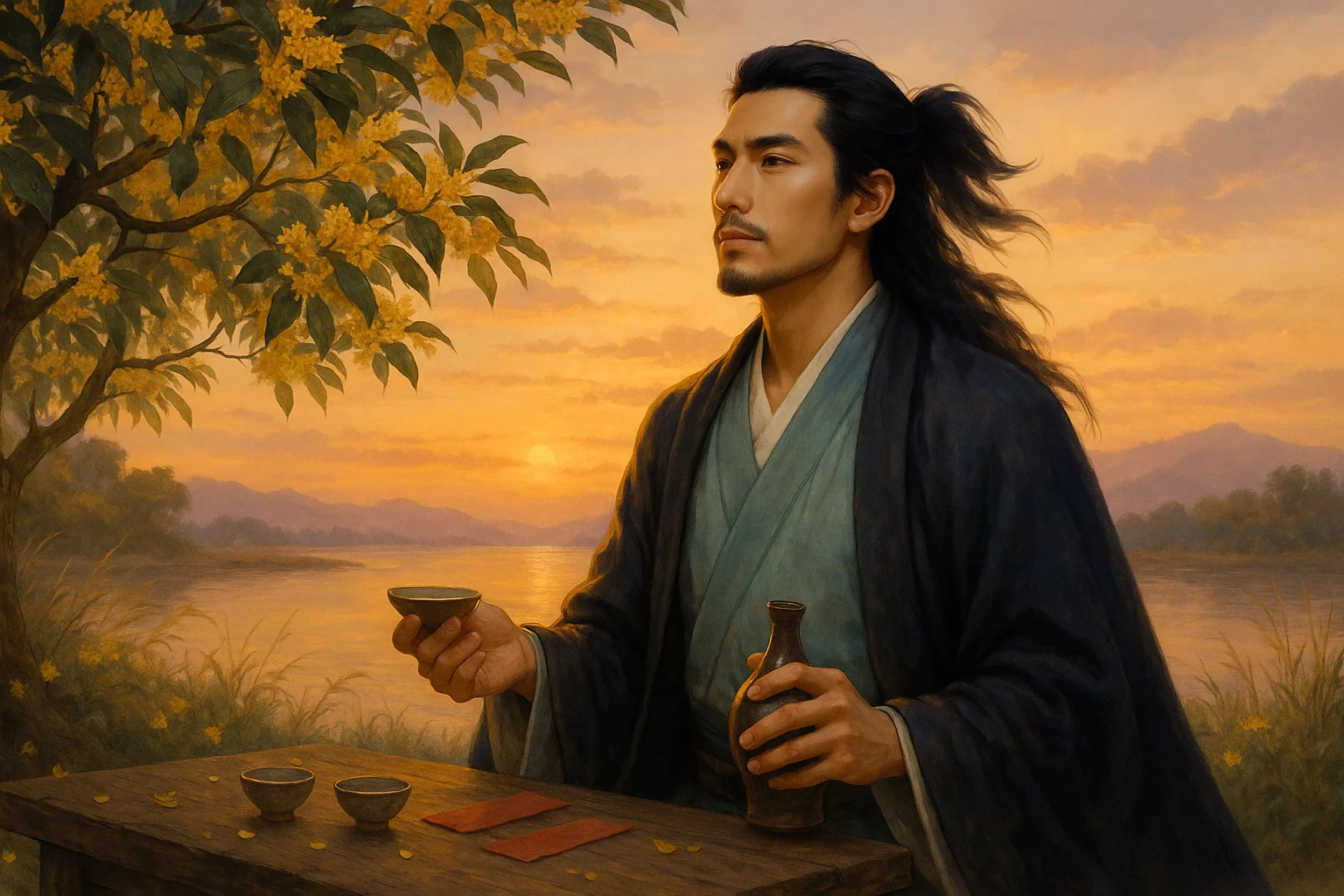
Liu Guo (刘过 1154 - 1206), a native of Taihe in Jiangxi, was a ci poet of the Bold and Unconstrained School (haofang pai) during the Southern Song Dynasty. Though he remained a commoner all his life, wandering the rivers and lakes, he associated with literary giants like Lu You and Xin Qiji. His ci poetry is impassioned and heroic, and his verse is vigorous and forceful. Stylistically close to Xin Qiji but even more unrestrained, Liu Guo became a central figure among Xin’s poetic followers.







